Peace Watch » Kashmir-Talk » Inside Stories About Kashmir and Indian Biographies
Inside Stories About Kashmir and Indian Biographies
Biographies and the Narratives
By
Z.G. Muhammad
“An autobiography can distort; facts can be realigned,” writes an author of Indian origin. There is some truth in his assertion but it cannot be the whole truth. Notwithstanding, autobiographies and memoirs being overwhelmingly subjective, they do provide warp and weft for recording history of the political struggles. This genera of literature, besides providing an insight into behind the scene happenings that have impacted history and politics of a nation also contribute in enriching and strengthening a nation’s narrative.
In our case, since the whole story of our ninety years old struggle for achieving political and civil rights for overwhelming majority is yet to be told, this genera of literature has an important role to play in deconstructing and demolishing the “hegemonic discourses’.
For the Kashmir narrative, it is not only the biographies and memoirs of the protagonists of our movement or key players in our struggle for political rights that are important. The memoirs and autobiographies of important people that have strutted across the corridors of power in New Delhi in fact also strengthen the Kashmir narrative’.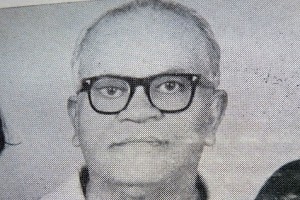
Had not M.O. Mathai, Personal Secretary of Nehru and a member of the Indian delegation to United Nations published his memoirs, ‘My Days with Nehru’, we would not have known many behind the scene stories about Kashmir in the Security Council. We would not know that India later on regretted over inclusion of Sheikh Abdullah in its delegation. And we would not know how Pakistan team in the Security Council succeeded in demolishing Abdullah’s discourse and making words like “stooge and Indian Quisling” stick to him before the comity of nations. Abdullah lascivious engagements at UN would have remained buried in the debris of untold stories never to be told. Indian delegation denounced Sheikh Abdullah as a ‘dandy’, who instead of being an asset had proved a liability for them. Perhaps we would not also know that Indian Home Minister, ‘Sardar Patel never wanted Kashmir to be part of India.’ That, in 1953 ‘Feroze Gandhi wanted to see Sheikh Abdullah killed and pushed down the hill at the Ceasefire line instead of being imprisoned would not have been documented at all.
The memoirs of B.N. Mullik, ‘Kashmir- My Years with Nehru’ with all lop-sidedness are also important for the Kashmir narrative. It documents some important incidents about the political developments during fifties and the 1964 Holy Relic Movement that otherwise would perhaps never been told. And at the same time leaves some big questions for researchers that call for an answer for strengthening the Kashmir narrative. Even the memoirs of senior Indian Army Officer like Brigadier L.P. Sen ‘Slender was Thread’ and ‘Nehru’s Emissary to Kashmir’ by Hira Lal Atal are important for telling the whole Kashmir story. Had not Atal recorded his memoirs, perhaps it would have remained a secret never to be told that Sheikh Abdullah’s arrest had been planned in July and it was a military operation. Atal writes, ‘I left for Srinagar with Skelton-staff in July 1953 for assessing the situation and conducting the “exercise.”
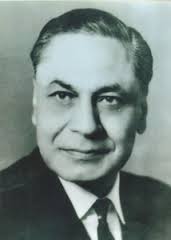 For telling full story about the elections and their genuineness, ‘Nice Guys Finish Second,’ memoirs by B.K. Nehru, a former governor of the State is important. It tells us that all elections held in the state have been farce. Memoirs’ of some prominent Indian journalist from Frank Morass to Prem Bhatia to Kuldip Nayar do provide grist to the Kashmir narrative. Frank Morass, who was known for his proximity to first Prime Minister of India in his memoirs’ ‘Witness to an Era” takes lid off from some inside stories about Kashmir. It was but for his proximity to the corridors of power that he recorded, ‘In 1962, USA was pushing through the idea of partitioning of Jammu and Kashmir with Kashmir going to Pakistan with provision of allowing a corridor for India to Ladakh for army supplies.’
For telling full story about the elections and their genuineness, ‘Nice Guys Finish Second,’ memoirs by B.K. Nehru, a former governor of the State is important. It tells us that all elections held in the state have been farce. Memoirs’ of some prominent Indian journalist from Frank Morass to Prem Bhatia to Kuldip Nayar do provide grist to the Kashmir narrative. Frank Morass, who was known for his proximity to first Prime Minister of India in his memoirs’ ‘Witness to an Era” takes lid off from some inside stories about Kashmir. It was but for his proximity to the corridors of power that he recorded, ‘In 1962, USA was pushing through the idea of partitioning of Jammu and Kashmir with Kashmir going to Pakistan with provision of allowing a corridor for India to Ladakh for army supplies.’
Prem Bhatia’s memoirs are an exposure about India, despite Washington nudging Jawaharlal Nehru and Ayub Khan for holding talks for resolving Kashmir Dispute was not serious at all. The six round of Swaran Singh- Bhutto talks were just another exercise in procrastination. Quoting Swaran Singh Bhatia tells us that for India Kashmir was a village belle in a show case just to be shown to Pakistan and never allowed to be touched.
In the post 1990, scenario I see “My Country My Life” autobiography of L.K. Advani with a foreword by Atal Bihari Vajpayee as an important work for Kashmir narrative. It enables one to understand how the BJP sees the Kashmir problem and speaks about the four pronged strategy of the party in dealing with Kashmir. The author has also documented his talks with a section of the Hurriyat Conference which perhaps would have remain untold. I see phase five of his autobiography as important for telling the Kashmir story and New Delhi mind-set.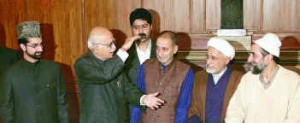
Kashmir leadership has been traditionally shy of telling the behind the scene stories. Many contemporise of Sheikh Abdullah despite maintaining journals for fear of their leader never told their stories. It even took forty four years for memoirs of Munshi Ishaq to see light of the day. Of top politician, who had a role to play in 1947 and afterward, I see Syed Mir Qasim’s autobiography in as much as it tells us that for New Delhi all Kashmir leaders from Sheikh Abdullah downwards including him and Bakshi as well were and are nothing but pawns that lose their importance after being removed from the chessboard. In quoting Chief Secretary and Deputy Director summoning Chief Minister, G.M. Sadiq to Raj Bhavan in the middle of night and order him to arrest Bakshi Ghulam Mohammad for anti-national activities he does tell us the value of the state chief ministers in the eyes of the GOI. Notwithstanding, Syed Mir Qasim’s autobiography largely being self-congratulatory does tell us stories which otherwise would never have become part of the Kashmir narrative.
Surprisingly, secretive-elitists approach of preceding and contemporary leadership in not telling the whole story to people has not only confounded the people’s narrative but also made the goal hazier. Had Molvi Masoodi, Bakshi Ghulam Mohammad, Ghulam Mohammad Sadiq or Mirza Afzal Beg honestly told their stories these would have enriched the Kashmir narrative.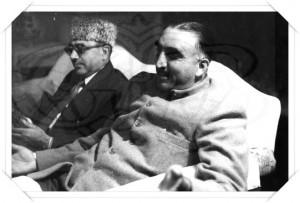
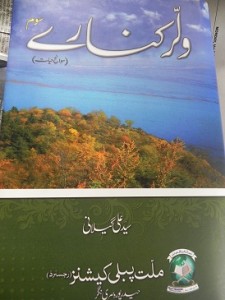 Syed Ali Shah Geelani, amongst the contemporary leader has so far been only leader who has been documenting contemporary history and sharing behind the scene happenings and machinations with people. Third volume of his autobiography, ‘Wular Kinari’ has been published few days back. It documents political struggle of the author exhaustively and also mentions about his personal life. It could be classified as memoirs not as biography.
Syed Ali Shah Geelani, amongst the contemporary leader has so far been only leader who has been documenting contemporary history and sharing behind the scene happenings and machinations with people. Third volume of his autobiography, ‘Wular Kinari’ has been published few days back. It documents political struggle of the author exhaustively and also mentions about his personal life. It could be classified as memoirs not as biography.
The 660 pages hardbound book priced at rupees 475, has been published by the Millat Publishers, Srinagar. It covers behind the scene developments from 1995- 2014. One of the most crucial period the contemporary Kashmir history starting with the announcement of first Assembly elections after six years Presidents rule. The successful boycott of these elections by the Hurriyat Conference with Abdul Gani Lone, Mohammad Yasin Malik and the author in the vanguard. It is a very subtle commentary on dissension within the ranks of the Hurriyat Conference over election of the chairman of the conglomerate and boycotting of the elections that ultimately led to the vertical division in the multiparty combine. The four point formula of Pakistan President General Pervez Musharraf, which he called as “out of box solution” is one of the chapters. Seeing this formula as total U-turn from historical stated position of Pakistan and a betrayal of fundamental right of the people of Jammu and Kashmir, the protagonists of right to self-determination movement attributes this change in Pervez Musharraf to his loss of ‘self-confidence and mental depression.’ What made Pervez Musharraf to take a U-turn is matter of debate.
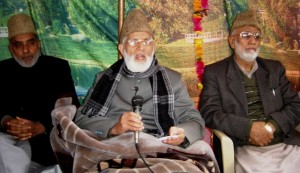 Why Syed Ali Shah Geelani had become a bete noire for the Jammat-e-Islamia when he had emerged as one of the icons of the ‘resistance movement’ is an important question that the book poses. From custodial killings to engagement of Hizb with Government of India; from India-Pakistan summits to the summers of dissent, the book has documented every important development and also provides insight into behind the scene developments.
Why Syed Ali Shah Geelani had become a bete noire for the Jammat-e-Islamia when he had emerged as one of the icons of the ‘resistance movement’ is an important question that the book poses. From custodial killings to engagement of Hizb with Government of India; from India-Pakistan summits to the summers of dissent, the book has documented every important development and also provides insight into behind the scene developments.
Abridged version published in Greater Kashmir on 11 May 2015
The author perhaps wants introduction to this volume of his memoirs cascading with pain and agony, brimming with concern about gullible people being tricked by unscrupulous and double-dealing politicians to pass as his last testament for people of the state in general and youth in particular.
Filed under: Kashmir-Talk · Tags: Abdullah, Kashmir Dispute, peacewatch, Syed Ali Geelani, z
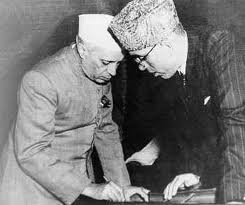








Assalamo alia kum
Thank you very much for your scholarly work on Kashmir. Kindly continue your excellent efforts for the future generations, so that they make decisions after having a look on past. Distortion of history is really a sin.
Ghulamullah